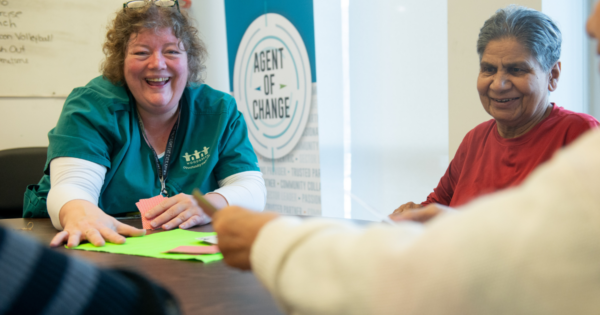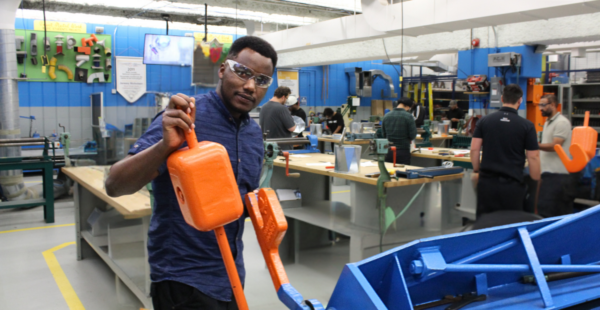The last time you sat and watched a film it probably took about two hours. But did you leave feeling like you were a better person because of it? Like you’d helped your community? Or made someone feel less alone? If not, there is a way to achieve all that in those same two hours: Meals on Wheels.
“There is a great gratification in knowing you are helping someone,” says Jim Cant. He and his partner, Mary Sullivan, have volunteered with Meals on Wheels for the last six years. Twice a week they leave their East Toronto home and head to Bridgepoint Health at Broadview and Gerrard. There they pick up meals destined for local people who have difficulty cooking for themselves. “You get to see a wide range of people in different living situations,” says Sullivan. Clients include seniors, people with physical disabilities and cognitive impairments, and those recovering from illness or surgery, among others.

But Meals on Wheels is in desperate need of volunteers. Pre-COVID there were enough volunteers to cover all the people who needed meals delivered. But those numbers dropped by 60 per cent during the pandemic, leaving Meals on Wheels scrambling to get to everyone in need.
Apply to be a volunteer today!
Sullivan drives to wherever the meals are needed, usually within about a five kilometre radius, while Cant is a ‘runner’ meaning he takes the meals to the door and sometimes right into the client’s kitchen or freezer. The couple usually does about 14 drop offs, of which several are in the same apartment complex. Within two hours they are back at home.
“It gives a bit of structure to our days,” says Sullivan, who worked as a dietitian until she and Cant, a former Geologist and Software Developer, decided to retire in 2016. They knew then that they wanted to volunteer their time and have a direct impact on their local community.
“If it’s helping keep seniors, in particular, in their homes and gives them a bit of human contact every day, then what is 90 minutes out of my day?” says Cant.
NOT REQUIRED TO DRIVE OR HAVE A CAR
“It’s nice to visit with older folks,” says Tabitha Farmer, “they’re always so happy to see me and sometimes we have a little chit chat.” Farmer has been volunteering once a week for Meals on Wheels through WoodGreen for the past five years. She is a runner, meaning she goes to the door, knocks and gives people their food. She says it’s only a couple of hours a week, but it has given her a purpose since suffering a brain injury several years ago.
“It’s just so nice to see people and have something to do.”

Farmer says volunteering for Meals on Wheels is the perfect way for her to contribute to her community. She doesn’t own a car or drive, but she takes the TTC and is reimbursed tokens for days she volunteers. Because she is a runner who delivers the meals, someone else drives and she doesn’t need to. Those who drive are given a gas allowance for their deliveries.
Last year the Meals on Wheels program through WoodGreen delivered 54,000 meals to 570 clients. There are 12 routes in total. At a minimum that requires 12 runners and 12 drivers every day. Some volunteers do it once a week, others more. While it is a commitment, sometimes scheduling conflicts do happen or someone takes ill, meaning it is crucial to have a full roster of volunteers to help ensure everyone gets the meals they rely upon.
PROVIDING MEALS AND A VITAL SERVICE
“This program simply doesn’t run without volunteers,” says Elizabeth Ritchie. She knows firsthand the benefits of having Meals on Wheels in the community. For 30 years she worked at WoodGreen, with more than half of that as a social worker for seniors.
“I already knew I’d start volunteering once I retired,” says Ritchie, who has served as a meal runner for Meals on Wheels for the last six years. She usually does a route on Mondays delivering on average 15 meals and is done in a little more than an hour. She sometimes has a little chit chat with the clients, but it is when they don’t answer the door that Meals on Wheels takes on a whole new level of importance.

“Meals on Wheels is a great eye. It’s a safety check and a wellness check. There is a clear process for what to do if someone doesn’t answer the door, because it could mean they are in trouble.”
Ritchie says it isn’t down to volunteers to make any decisions on safety or wellness, only to report if something is out of the ordinary. She says this personal, human contact is not only beneficial to clients but also to social workers who may not be able to get out for in-person visits as much as they’d like.
“It’s such a simple thing in my life,” says Ritchie. “Knocking on someone’s door and saying ‘here’s your meal’, it’s not rocket science, but people are so grateful. I honestly wish more people did it.”
If you are interested in volunteering or simply have questions about what volunteering for Meals on Wheels involves, our website answers those questions and provides an application form.
If you would like to support Meals on Wheels, donations are accepted through the WoodGreen Foundation.





